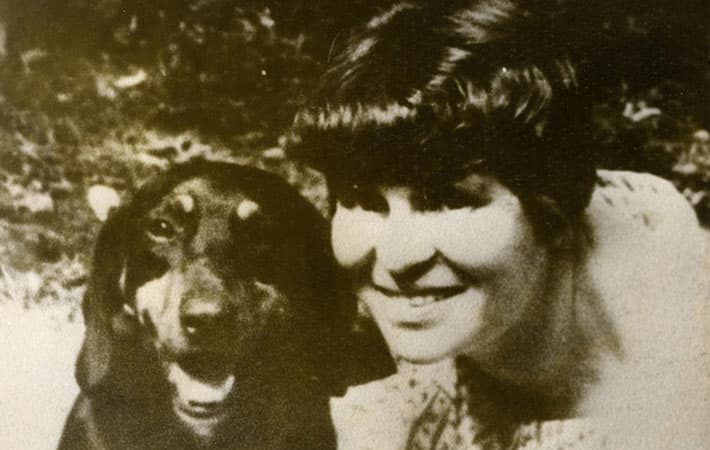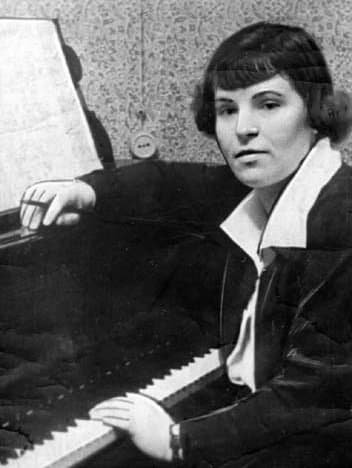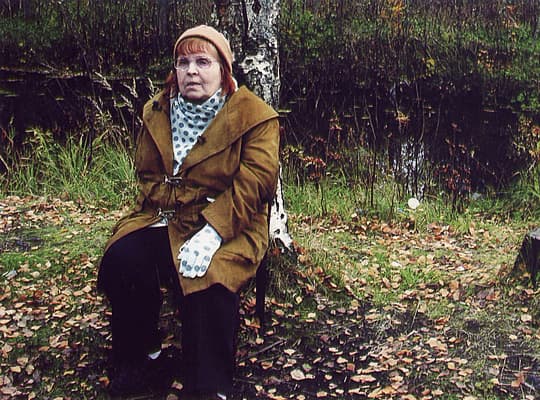It's all about the classical music composers and their works from the last 400 years and much more about music. Hier erfahren Sie alles über die klassischen Komponisten und ihre Meisterwerke der letzten vierhundert Jahre und vieles mehr über Klassische Musik.
Total Pageviews
Friday, March 22, 2024
Orpheum Madams - It Don't Mean A Thing
Berlioz: Hungarian March from La damnation de Faust
Composer Galina Ustvolskaya: The Shostakovich-Trained Iconoclast
By Emily E. Hogstadt, Interlude

Galina Ustvolskaya and her dog
But she was so much more than this. She was also fiercely independent, staggeringly talented, and completely unafraid. She not only refused to fit in a musical mold but threw out that mold entirely.
Today, we’re taking a look at the life and times of Soviet composer Galina Ustvolskaya.
Ustvolskaya’s Childhood
Galina Ustvolskaya was born on 17 June 1919 in Petrograd to an unmusical family. Her father was a lawyer, and her mother was a teacher from impoverished nobility.
Her childhood was lonely and full of financial pressures.
“I would wear an old coat of my father’s (which was too long for me) and his muffler, which I gave to a young friend. I loved to give gifts, although we did not have anything to spare. Since childhood, I could not tolerate these kinds of pressures.”
Her desire for financial security would later impact her career choices.
She loved music deeply from an early age. When she was young, her parents took her to a performance of Tchaikovsky’s opera Eugene Onegin, but the family had to leave when she started crying. “I want to be an orchestra,” she told them.
Time with Shostakovich
Ustvolskaya studied at a school for young people associated with the Leningrad Conservatory. In 1939, when she turned twenty, she joined Dmitri Shostakovich’s composition class. That year, she was the only woman in that class.
Shostakovich was intrigued by her and in awe of her talent. “I am convinced that the music of G. I. Ustvolskaya will achieve world fame and be valued by all who hold truth to be the essential element of music,” he wrote once. He also said, “It is not you who are under my influence, but I who am under yours.”
He valued her opinion so much that he asked for her feedback on his own compositions. He also used a theme from her clarinet trio in his fifth string quartet (from 1952) and his Suite on Verses of Michelangelo Buonarroti (from 1974, toward the very end of his life).
Ustvolskaya studied in his class twice – once from 1939 to 1941 and again from 1947 to 1948. That six-year break coincided with the war, as well as the devastating two-and-a-half-year siege of Leningrad.
A month into the siege of Leningrad, Shostakovich was evacuated to Moscow and Ustvolskaya to Tashkent, the current-day capital of Uzbekistan, along with others linked to the Conservatory. In 1943, she worked in a hospital in the city of Tikhvin, two hundred kilometers from St. Petersburg.

Galina Ustvolskaya
She later made it very clear that she was not keen on an association with Shostakovich. She called his music “dry and lifeless” and wrote to her publisher, “One thing remains as clear as day: a seemingly eminent figure such as Shostakovich, to me, is not eminent at all, on the contrary, he burdened my life and killed my best feelings.”
Her distaste for him may have been rooted in extra-musical reasons. She later claimed that Shostakovich proposed marriage to her, but she turned him down.
Later, she went even further: “There is no link whatsoever between my music and that of any other composer, living or dead,” she once proclaimed.
Ustvolskaya and Soviet Propaganda
From 1947 to 1977, she taught composition at the Leningrad Conservatory. She didn’t think of herself as a particularly talented professor – composition was her true calling – but teaching was a way to make a living.
In February 1948, a resolution went out from the Soviet government, accusing some composers of Formalism (i.e., failing to compose music that fully supported the state).
After this, she split her creative self into two parts. One composed propaganda pieces acceptable to Soviet leadership, while the other wrote secret avant-garde works that she knew might never be heard.
Writing music to please the authorities was soul-destroying, but she was apparently very good at it. Her tone poem Stepan Razin’s Dream opened the Leningrad Philharmonic’s 1949 season, to acclaim. She was even nominated for the Stalin Prize.
However, in 1962, she hit her limit. From that time on, she vowed to only write what she truly wanted to write, and she worked to destroy all traces of everything she ever wrote for political reasons.
Fortunately, later in the century, the Soviet Union started being easier on modernist composers, and allowing them to share some of their more controversial music. Ustvolskaya slowly began sharing some of the music she’d been keeping hidden.
Ustvolskaya’s Later Years

Galina Ustvolskaya
By the 1970s the Leningrad Union of Composers began presenting evenings of her music, and critics were impressed.
Her music has several distinguishing features, including extreme dynamics, unusual instrumentation, and brutal and relentless repetition.
The website Ustvolskaya.org writes, “Ustvolskaya’s music is unique, unlike anything else; it is exceedingly expressive, brave, austere, and full of tragic pathos achieved through the most modest of expressive means.”
Unfortunately, for years, hardly anybody outside the Soviet Union heard it. But in 1989 her work was performed at the Holland Festival, and it made a big impression on audiences.
She was living as a bit of a hermit by the 1990s, but she traveled to Amsterdam to watch performances of her work. Although she hated interviews, she agreed to one with journalist Thea Derk. But when the time for the interview came, she nearly backed out, and only agreed to partake after she was assured she could answer questions with monosyllables, without elaboration. (Luckily, Derk was able to get more than that out of her.)
She was asked how she liked the performance she’d heard. “Not very much,” she said bluntly. She elaborated: “The acoustics were not favourable, so that the piano didn’t come out properly, and the five double basses should have been placed more to the front. Moreover, the ensemble, recruited more or less ad hoc from members of the Concertgebouw orchestra, hadn’t as yet properly mastered the score, and the reciter wasn’t adequately amplified. But yesterday it was better and I hope it will again be better tonight.”
Ustvolskaya’s Death and Legacy
A perfectionist iconoclast to the end, Galina Ustvolskaya died in 2006 in St. Petersburg. She was eighty-seven years old.
In 1998 she gave a description of her life to an interviewer that serves as a kind of thesis statement about her music:
“The works written by me were often hidden for long periods. But then if they did not satisfy me, I destroyed them. I do not have drafts; I compose at the table, without an instrument. Everything is thought out with such care that it only needs to be written down. I’m always in my thoughts. I spend the nights thinking as well, and therefore do not have time to relax. Thoughts gnaw me. My world possesses me completely, and I understand everything in my own way. I hear, I see, and I act differently from others. I just live my lonely life.”
Thursday, March 21, 2024
🎻 Johann Strauss II: Overture to the operetta “Carneval in Rome”
Franz Lehar- "Gold und Silber",Walzer (Springtime In Vienna 98)
Tuesday, March 19, 2024
El amor brujo - Manuel de Falla
GRIEG - IN THE HALL OF THE MOUNTAIN KING - ORGAN OF MÜPA BUDAPEST
Monday, March 18, 2024
Carl Michael Ziehrer - Nachtschwaermer (Night Owl Waltz)
E. Humperdinck: "Abendsegen" aus der Oper Hänsel und Gretel
Sunday, March 17, 2024
CCP's 'The Met Live in HD' returns with iconic Verdi, Puccini operas
'Der Rosenkavalier' is Richard Strauss’ most popular opera about a wise woman of the world who is involved with a much younger lover.
Dolly Dy-Zulueta - Philstar.com
MANILA, Philippines — The Cultural Center of the Philippines (CCP)’s "The Met Live in HD" opera production series returns on stage this March with an impressive lineup of iconic operas for its ninth season.
The opera program of the CCP, which are operas but captured while being staged and shown in cinemas, presents seven classic operas: "Der Rosenkavalier" by Richard Strauss, "Nabucco" by Giuseppe Verdi, "Carmen" by Georges Bizet, "X: The Life and All Times of Malcolm X" by Anthony Davis, "La Forza del Destino" by Giuseppe Verdi, "La Rondine" by Giacomo Puccini and "Dead Man Walking" by Jake Heggie.
Opening the new season on March 5 is "Der Rosenkavalier," Strauss’ most popular opera about a wise woman of the world who is involved with a much younger lover. Forced to accept the laws of time, she gives him up to a pretty young heiress.
First premiered in 1911, set in an idealized Vienna, the tragic opera is a comic yet nostalgic fantasy drama with striking touches of philosophy and social commentary on its libretto written by Viennese author and poet Hugo von Hofmannsthal and sung with a magnificent score by Strauss.
A dream cast assembles for this production, with Soprano Lise Davidsen performing as the aging Marschallin, opposite mezzo-soprano Samantha Hankey as her lover Octavian and soprano Erin Morley as Sophie, the beautiful younger woman who steals his heart. Bass Gunther Groissbock returns as the churlish Baron Ochs and Brian Mulligan is Sophie’s wealthy father, Faninal. Maestro Simone Young takes the Met podium to oversee Robert Carsen’s fin-de-siecle staging.
Next to hit the stage is Giuseppe Verdi’s "Nabucco" on April 2. Ancient Babylon comes to life in this classic Met staging of biblical proportions, Verdi and Temistocle Solera took some liberties with biblical history and created a stirring drama about the fall of ancient Jerusalem at the hands of Nebuchadnezzar (who is Nabucco, for short).
Verdi’s third opera, which had a world premiere in Teatro alla Scala, Milan, in 1842, is known for its exhilarating chorus “Va, pensiero” and titular aria “Dio di Giuda.”
Baritone George Gagnidze makes his Met role debut as the imperious king Nabucco, performing with soprano Liudmyla Monastyrska, who reprises her role as vengeful daughter Abigaille. Mezzo-soprano Maria Barakova and tenor SeokJong Baek take on the roles of Fenena and Ismaele, whose love transcends politics. Bass Dmitry Belosselskiy repeats his celebrated portrayal of the high priest Zaccaria. Daniele Callegari conducts.
Ancient Babylon comes to life in Met's staging of biblical proportions in Giuseppe Verdi’s 'Nabucco.'
Premiering on the Philippine big screen on May 7 is Georges Bizet’s "Carmen." Acclaimed English director Carrie Cracknell makes her Met debut with Bizet’s masterpiece. First premiered in Paris in 1875, the opera talks about a gypsy seductress who lives by her own rules. At the heart of this tragic romantic tale are gendered violence, abusive labor structures and the desire to break through societal boundaries. All these social issues are still relevant today.
One of the most frequently staged operas in the world, this Met opera staging stars dazzling young mezzo-soprano Aigul Akhmetshina in the title role, alongside tenor Piotr Beczala as Carmen’s troubled lover Don José, soprano Angel Blue as the loyal Micaëla and bass-baritone Kyle Ketelsen as the swaggering Escamillo. Daniele Rustioni conducts Bizet’s heart-pounding score.
Anthony Davis’s groundbreaking and influential opera, "X: The Life and Times of Malcolm X" will arrive at the Ayala cinema on June 4. Robert O’Hara, theater luminary and Tony-nominated director of Slave Play, oversees a potent new staging that imagines Malcolm as an Everyman whose story transcends time and space.
An exceptional cast of breakout artists and young Met stars enliven the operatic retelling of the civil rights leader’s life, which premiered in 1986. Baritone Will Liverman, who triumphed in the Met premiere of "Fire Shut Up in My Bones," sings Malcolm X. Soprano Leah Hawkins performs as his mother Louise, while mezzo-soprano Raehann Bryce-Davis as his sister Ella, bass-baritone Michael Sumuel as his brother Reginald, and tenor Victor Ryan Robertson as Nation of Islam leader Elijah Muhammad. Kazem Abdullah conducts the newly revised score, which provides a layered, jazz-inflected setting for the libretto by esteemed writer Thulani Davis.
Catch Yannick Nézet-Séguin’s masterpiece on Verdi’s grand tale of ill-fated love, deadly vendetta and family strife, "La Forza del Destino," on July 2.
Georges Bizet’s 'Carmen' first premiered in Paris in 1875 and talks about a gypsy seductress who lives by her own rules.
Director Mariusz Trelinski delivers Met’s first new Forza in nearly 30 years, setting the scene in a contemporary world and making extensive use of the theater’s turntable to represent the unstoppable advance of destiny that drives the opera’s chain of calamitous events.
A gripping tale about Leonora, a beautiful daughter of the wealthy Marquis who has fallen in love with a Peruvian nobleman who is deemed unworthy because of his Incan blood. When the couple elopes, an accident happens that kills the protagonist’s father. Leonora’s brother swears to avenge their father’s death. In the ensuing chaos, the lovers become separated.
Stellar soprano Lise Davidsen triumphs with her portrayal of Leonora, one of the repertory’s most tormented yet thrilling heroines. The distinguished cast features tenor Brian Jagde as Leonora’s forbidden beloved Don Alvaro, baritone Igor Golovatenko as her vengeful brother Don Carlo, mezzo-soprano Judit Kutasi as the fortune teller Preziosilla, bass-baritone Patrick Carfizzi as Fra Melitone, and bass Soloman Howard as both Leonora’s father and Padre Guardiano.
Another bittersweet love story makes a rare premiere on August 13 with Puccini’s "La Rondine." It follows the plight of Magda, who falls in love with a handsome young Ruggero, but her unfounded fears about her checkered past somehow ruin their happily-ever-after. Soprano Angel Blue and tenor Jonathan Tetelman portray the star-crossed lovers.
Maestro Speranza Scappucci conducts Nicolas Joël’s Art Deco–inspired staging, which transports audiences from the heart of Parisian nightlife to a dreamy vision of the French Riviera. In their Met debuts, soprano Emily Pogorelc and tenor Bekhzod Davronov complete the sterling cast as Lisette and Prunier.
The 9th season of CCP’s "The Met Live in HD" culminates with American composer Jake Heggie’s masterpiece "Dead Man Walking" on September 3. In the haunting new Met production, Heggie and librettist Terrence McNally bring to life Sister Helen Prejean’s memoir about her fight for the soul of a condemned murderer.
Directed by Ivo van Hove, Met’s most widely performed new opera of the last 20 years stars mezzo-soprano Joyce DiDonato as Sister Helen. The outstanding cast features bass-baritone Ryan McKinny as the death-row inmate Joseph De Rocher, soprano Latonia Moore as Sister Rose, and legendary mezzo-soprano Susan Graham – who sang as Helen Prejean in the opera’s 2000 premiere – as De Rocher’s mother. Met music director Yannick Nézet-Séguin takes the podium for this landmark opera.
Anthony Davis’s groundbreaking and influential opera, 'X: The Life and Times of Malcolm X.'
All screenings are scheduled at 5:30 p.m. at Ayala Malls Greenbelt 3 Cinema 1 in Makati City. Tickets are priced at P450. Students and young professionals get a discounted price of P100 upon presentation of a valid ID. Tickets are available at Greenbelt ticket booths and the website www.sureseats.com.
The CCP's "The Met: Live in HD" is a special program of the CCP Film, Broadcast, and New Media Division (CCP FBNMD), under the Production and Exhibition Department, in partnership with The Metropolitan Opera of New York, the Filipinas Opera Society Foundation Inc., and Ayala Malls Cinemas. The series showcases The Metropolitan Theater’s operatic productions through High-Definition (HD) digital video technology and Dolby Sound, recreating the experience of watching an opera production at the Met “live.”


